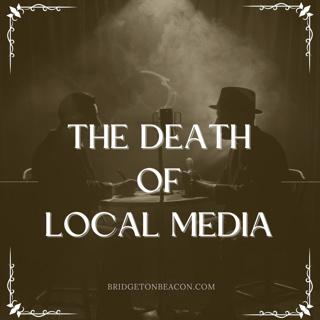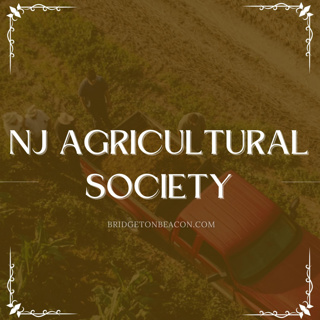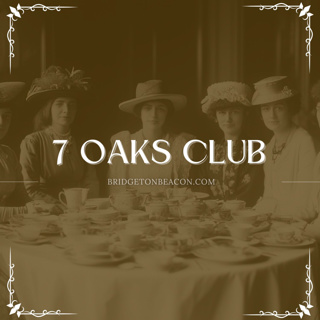
Revitalizing Local Media: Fundraising and Community Engagement
In this conversation, producer Tom Ritter reports to Beacon founder, Meg McCormick Hoerner on adding various fundraising initiatives to the website of the Bridgeton Beacon. They discuss local media, working with Bridgeton youth, and a new project called "Memory Podcasts", which allows you to sponsor the recording session for a local beacon of the community. The dialogue explores the legacy of Paul Hunsberger and the importance of preserving local history through storytelling. The speakers highlight the potential of using AI to enhance storytelling and the significance of crowdsourcing community stories to connect the past with the present. takeaways The Bridgeton Beacon now has multiple fundraising channels to support its initiatives. Engaging the community through memory projects can foster local connections. Preserving local history is essential for future generations. Every individual's story is valuable and worthy of preservation. Utilizing technology can enhance the storytelling process. Crowdsourcing stories can help build a richer community narrative. The legacy of influential figures like Paul Hunsberger is crucial to local history. AI can assist in organizing and presenting community stories effectively. Community contributions should directly support local content production. Encouraging feedback from the community can guide future projects. Chapters 00:00 Introduction to Bridgeton Beacon's Initiatives 02:18 Fundraising Channels and Community Engagement 04:25 Memory Podcasts: Preserving Local History 07:20 The Importance of Oral History 10:00 Community Contributions and Nonprofit Goals 12:38 Facilitating Conversations Across Generations 15:24 Leveraging AI for Engaging Interviews 19:19 Exploring Creative Questions for Engagement 21:50 Innovative Ideas for Memory Preservation 24:18 The Hunsberger Project: A Legacy of Stories 29:48 Building a Digital Archive of Memories 35:23 Connecting Past, Present, and Future Stories
30 Jan 39min

From Advertising to Advocacy: A Community Hero's Journey
In this conversation, Meg McCormick Hoerner is joined by Ms. Nina Young, a recipient of the Community Hero Award, about her journey from a 30-year career in advertising to becoming an advocate for education and community service. They discuss her impactful work in various community programs, including initiatives to support families, address hunger through a mobile feeding bus, provide shelter during cold weather with Code Blue, and create the Village of Hope for the homeless. The conversation highlights the importance of community service and the positive changes that can be made through dedicated efforts. takeaways Ms. Young received the Community Hero Award for her contributions. She transitioned from advertising to early childhood education. Her work includes supporting families with daycare funding. The mobile feeding bus initiative addresses hunger in the community. Code Blue provides shelter during cold weather. Village of Hope offers temporary housing for the homeless. Community programs empower youth and families. Collaboration with local organizations enhances program effectiveness. Transportation is a critical issue for job access. Community service is about making a difference in people's lives. Sound Bites "I went back to school for early childhood education." "We came up with a bus. I designed a bus." "Code Blue was developed by Mayor Kelly and Pastor Rob." "It's a stepping stone to your next step in your life." "If every person can just touch even one person's life." "You never want to judge, right? You never know." Chapters 00:00 Introduction and Community Hero Award 01:30 Reinventing a Career: From Advertising to Education 05:41 Impactful Community Programs: Supporting Families 11:46 Addressing Hunger: The Mobile Feeding Bus Initiative 16:47 Code Blue: Providing Shelter in Cold Weather 22:10 Village of Hope: A Pathway for the Homeless 28:32 Conclusion: The Importance of Community Service
28 Jan 30min

Gary Fischer and The Bridgeton Invitational Baseball Tournament
In late 2024 Meg McCormick Hoerner interviewed the recipients of the BACC Hometown Hero awards so we could produce a short compilation of the winners. (https://www.youtube.com/watch?v=BPZF7JQbakY) This is the first of the series to be released in it's full form, with local Beacon, Gary Fischer. In this conversation, Gary Fischer, the recipient of the 2024 Community Hero Award, shares his journey from a player to the director of the Bridgeton Invitational Tournament. He reflects on his extensive baseball career, the significance of the tournament in the community, and the challenges faced in revitalizing the event. Fischer discusses unique tournament rules that enhance the experience and highlights the strong competition in recent years, emphasizing the importance of community support in keeping the tournament alive. takeaways Gary Fischer has played in the Bridgeton Invitational Tournament for five decades. The tournament has a rich history dating back to 1962. Community support is crucial for the success of local events. Fischer took over as director to ensure the tournament's future. The tournament was moved from August to May to increase participation. Unique rules like the speed clock enhance the tournament experience. The competition level has increased in recent years with new teams. Fischer's son played professional baseball, showcasing the tournament's impact. The event fosters a strong sense of community and family atmosphere. Volunteers are essential for the tournament's operations. Chapters 00:00 Celebrating Community Heroes 01:52 A Legacy of Baseball: Gary Fisher's Journey 08:00 Reviving the Bridgeton Invitational Tournament 12:12 Innovations in Tournament Rules 18:03 The Future of the Bridgestone Invitational
18 Jan 22min

The Death of Local Media
This conversation explores the significant decline of local media, particularly in low-income areas, and its impact on community engagement and democracy. Episode Page: https://BridgetonBeacon.com/death-of-local-media Edie Horner discusses the challenges faced by local news outlets and highlights the efforts of the Bridgton Beacon, a nonprofit media platform aimed at revitalizing local journalism. The discussion emphasizes the importance of community involvement in supporting local news initiatives and the need for innovative solutions to keep local stories alive. takeaways The decline of local media has left many communities uninformed. Low-income areas are disproportionately affected by the loss of local news. Print media has been declining for decades, impacting journalism jobs. Podcasts and online platforms can provide accessible news alternatives. Community initiatives like the Bridgton Beacon can help fill the news gap. Engaging local voices is crucial for effective journalism. Local news plays a vital role in civic engagement and democracy. Community involvement is essential for the sustainability of local media. Innovative solutions are needed to support local journalism. Reviving local news requires collective action and awareness. Chapters 00:00 The Decline of Local Media 03:00 Bridgton Beacon: A Community Initiative 05:58 Challenges of Local News Production 08:52 Engaging the Community in Local Journalism 12:08 The Impact of Local News on Civic Engagement 15:00 Reviving Local Journalism: A Call to Action
22 Nov 202425min

Farmers Against Hunger with Newell Thompson
The Bridgeton Beacon welcomes Newell Thompson for a conversation that explores the New Jersey #Agricultural Society and its initiatives, particularly the Farmers Against Hunger program. Thompson discusses the history, mission, and impact of the organization, emphasizing the importance of education, community engagement, and local food systems. The discussion also highlights the role of migrant workers, the cultural significance of agriculture, and the need for volunteer support to address food insecurity in New Jersey. takeaways The New Jersey Agricultural Society was founded in 1781. Farmers Against Hunger collects and distributes food to those in need. Education is crucial for understanding the value of agriculture. Consumer behavior can be influenced to support local food systems. Seasonal eating enhances nutritional value and supports local farmers. Volunteering is essential for food collection efforts. Migrant workers play a vital role in agriculture. Respectful treatment of workers is key to successful farming. Agriculture contributes significantly to New Jersey's culture. Preserving agricultural land is important for future generations. Sound Bites "Farmers Against Hunger began 30 years ago." "We collect about one and a half million pounds of food." "Education is about the value of agriculture." Chapters 00:00 Introduction to New Jersey Agricultural Society 03:00 Farmers Against Hunger: Mission and Impact 05:53 Education and Leadership in Agriculture 09:11 Understanding New Jersey's Agricultural Landscape 11:58 Consumer Behavior and Local Food Systems 15:12 The Importance of Seasonal Eating 18:03 Volunteer Opportunities and Community Engagement 20:49 Fundraising and Support for Farmers Against Hunger 24:07 Building Relationships with Farmers 27:00 The Role of Migrant Workers in Agriculture 30:07 Cultural Significance of Agriculture 32:49 Future of Agriculture in New Jersey
25 Okt 202446min

Riverfront Renaissance Center for the Arts with Diane Rogers
The conversation focuses on the Riverfront Renaissance Center for the Arts, in Millville, highlighting its mission to support local artists and engage the community through various art programs and exhibits. Diane Rogers, the executive director, discusses the center's history, its role in promoting the arts in Cumberland County, and the importance of collaboration with local artists and organizations. The center offers art education programs, hosts exhibitions, and provides a space for artists to showcase their work. Additionally, the conversation touches on upcoming events, membership opportunities, and the significance of community involvement in the arts. takeaways The Riverfront Renaissance Center has been a community hub for the arts since 2001. The center collaborates with local artists and organizations to promote art education. Art exhibits change regularly, showcasing a variety of local talent. Membership at the center provides artists with opportunities to display their work. The center hosts themed exhibits that allow artists to participate without fees. Community engagement is a key focus, with events open to the public. The center has a gift shop that supports local artists and raises funds for operations. Upcoming events like the High Street Arts Fest aim to showcase local art and artists. The art library offers resources for artists and the community to learn about art history and techniques. Funding from organizations like the New Jersey State Council for the Arts supports the center's initiatives. Sound Bites "The arts are alive in Cumberland County." "We are here for the artists." "It's an art community center, definitely." Chapters 00:00 Introduction to the Riverfront Renaissance Center 01:09 Mission and Community Engagement 04:05 Art Exhibits and Local Artists 09:04 Membership and Artist Support 12:43 Open Calls and Community Involvement 19:25 The Role of the Arts Center in the Community 24:36 Gift Shop and Fundraising 26:06 Upcoming Events and Collaborations 30:53 Art Library and Artist Studios 36:31 Funding and Support for the Arts
23 Okt 202439min

7 Oaks Club and Quilting with Harriett Weber
In this engaging conversation, Harriett Weber shares her experiences at the West Cumberland Senior Center, highlighting the history and activities of the Seven Oaks Club, her passion for quilting, and her community involvement. She reflects on the evolution of women's roles in organizations, her career as a nurse, and the legacy of Weber's Candy Store, all while emphasizing the importance of friendship and creativity in her life. takeaways Harriett Weber has been a member of the Seven Oaks Club since 1971. The Seven Oaks Club has a rich history dating back to 1895. Quilting serves as a therapeutic and creative outlet for Harriet. The Downing Street Quilters meet regularly to share and create quilts. Harriett emphasizes the importance of community involvement and support. The role of women in clubs has evolved significantly over the years. Harriett's career as a nurse has shaped her perspective on community service. Weber's Candy Store has a legacy of over 120 years in Bridgeton. Harriett enjoys teaching quilting to others at the Senior Center. Friendship and creativity are central themes in Harriet's life. Sound Bites "I could be here daily and not get bored." "We have a very, very short business meeting." "I have been quilting ever since." Chapters 00:00 Introduction to the Seven Oaks Club 02:56 History and Evolution of the Club 05:33 Community Impact and Contributions 08:13 Membership and Participation 11:01 Diverse Interests and Activities 14:07 Quilting: A Personal Journey 16:59 Career and Community Involvement 19:50 Legacy of Weber's Candy Store 22:58 Involvement in Local Organizations 25:47 Reflections on Life and Community 45:47 Introduction to Honey the Hunter 48:24 The Vibrant Community at West Cumberland Senior Center 50:49 The Art of Quilting and Seasonal Decor 52:38 The Quilting Process and Community Involvement 53:29 Conclusion and Future Visits
21 Okt 202454min

Bulldogs and Beacons Phase 2 Ra'shaun
In this segment, Tom Ritter discusses the planning and research process for a media project centered around the RRCA. This is the second phase in a project with a local student named Ra'shaun. Tom emphasizes the importance of utilizing modern technology and research tools to gather information efficiently, ensuring that the production team is well-prepared for their visit. Ritter highlights specific tools like Microsoft Copilot and Genealogy Bank, showcasing how they can aid in creating informative content. The conversation also touches on the significance of understanding the subject matter and scheduling interviews to facilitate deeper discussions during the production process. takeaways The Riverside Renaissance Center offers multiple galleries in one location. Using technology like Microsoft Copilot can streamline research. Creating a project brief helps the team stay informed. Historical research tools can provide valuable context. Understanding the subject matter leads to better interviews. Scheduling is crucial for effective production coordination. Researching community impacts enhances content quality. Preparation allows for deeper conversations during interviews. Utilizing various sources can enrich media projects. Pre-planning is essential for successful media production. titles The Art of Pre-Production Planning Harnessing Technology for Effective Research Sound Bites "We can produce a story that's deeply informative." "You should definitely check out the website of the subject." "This is a great service for historical research." Chapters 00:00 Project Overview and Objectives 01:15 Research Tools and Techniques 03:32 Utilizing Technology for Efficient Production 06:04 Scheduling and Coordination for Success 10:26 Moving Forward to Production
26 Sep 202411min





















